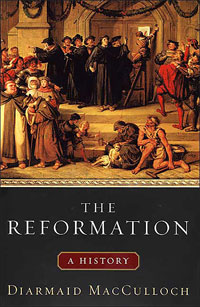Book Notes
 Diarmaid MacCulloch, The Reformation (New York: Viking, 2003), 792pp.
Diarmaid MacCulloch, The Reformation (New York: Viking, 2003), 792pp.
Diarmaid MacCulloch, Oxford professor of church history and fellow of the British Academy, has written a book that is magisterial in the fullest sense of the word—beautifully bound, meticulously researched, comprehensive in scale and scope, elegantly written, and appointed with nearly fifty plates, maps, and illustrations. It is the sort of book that makes reading and the enjoyment of his scholarship a privilege.
MacCulloch tells the story of how the Protestant Reformation tore through the European continent from the Baltics to the Black Sea and the Atlantic Isles to Russia, reconfiguring the geo-political maps, social structures, economies, churches, universities, ideas, and the everyday lives of ordinary people. By the time it was over (his narrative covers the years 1490–1700), European religion had pretty much become a function of geography in a badly fractured continent—cuius regio, eius religio, that is, "where you come from decides your religion, and within that region no other can be tolerated" (p. 160). This was an age when Christians tortured, burned, beheaded, and quartered each other over the nature of baptism and the Lord's Supper. Beginning with the Peasants' War in 1525 and lasting until the Peace of Westphalia (1648) that ended the Thirty Years War, there were precious few times and places without barbaric warfare. All in all, "it was a process of extreme mental and physical violence" (p. xix).
But I do not think we would want a church (Catholic or Protestant) or broader society that had not reformed our medieval inheritance. Recall that eastern Orthodox Christianity and greater Islam have not had any similar reformation. In some ways our own American experiment is a product of the Protestant Reformation. Eventually, toleration and generally peaceful co-existence did result as a sort of by-product (p. 652). Hereditary and state powers as divinely sanctioned rights succumbed to rule of law and the voices of citizens. Individual conscience displaced institutional coercion. All in all, the protestant mind set of the reformation spawned a historical way of thinking from which we continue to benefit even today, what MacCulloch calls "a remarkable exercise in honest thinking" (p. 680). However violent, shocking, and even incomprehensible we might find the age of the Reformation, "we have no right to adopt an attitude of intellectual or emotional superiority, especially in the light of the atrocities that twentieth-century Europe produced because of its faith in newer, secular ideologies" (p. 683). Soviet and Chinese communism alone resulted in over 100 million deaths. Besides, the subjects of this book and its time "were as capable of ruefulness and humility as, at our best, we can be" (ibid.).


